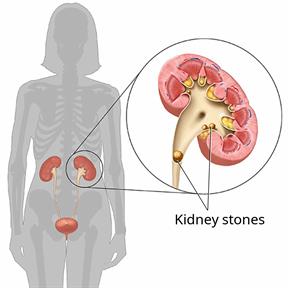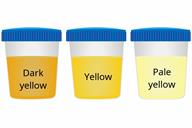Kidney Stones

Kidney stones are solid, rock-like deposits that form inside of the kidneys. The kidneys are a pair of organs that make urine. A kidney stone may form in a kidney and move into other parts of the urinary tract, including the tubes that connect the kidneys to the bladder (ureters), the bladder, and the tube that carries urine out of the body (urethra). As the stone moves through these areas, it can cause intense pain and block the flow of urine.
Kidney stones are created when high levels of certain minerals are found in the urine. The stones are usually passed out of the body through urination, but in some cases, medical treatment may be needed to remove them.
What are the causes?
Kidney stones may be caused by:
A condition in which certain glands produce too much parathyroid hormone (primary hyperparathyroidism), which causes too much calcium buildup in the blood.
A buildup of uric acid crystals in the bladder (hyperuricosuria). Uric acid is a chemical that the body produces when you eat certain foods. It usually leaves the body in the urine.
Narrowing (stricture) of one or both of the ureters.
A kidney blockage that is present at birth (congenital obstruction).
Past surgery on the kidney or the ureters.
What increases the risk?
The following factors may make you more likely to develop this condition:
Having had a kidney stone in the past.
Having a family history of kidney stones.
Not drinking enough water.
Eating a diet that is high in protein, salt (sodium), or sugar.
Being overweight or obese.
What are the signs or symptoms?
Symptoms of a kidney stone may include:
Pain in the side of the abdomen, right below the ribs (flank pain). Pain usually spreads (radiates) to the groin.
Needing to urinate often or urgently.
Painful urination.
Blood in the urine (hematuria).
Nausea.
Vomiting.
Fever and chills.
How is this diagnosed?
This condition may be diagnosed based on:
Your symptoms and medical history.
A physical exam.
Blood tests.
Urine tests. These may be done before and after the stone passes out of your body through urination.
Imaging tests, such as a CT scan, abdominal X-ray, or ultrasound.
A procedure to examine the inside of the bladder (cystoscopy).
How is this treated?
Treatment for kidney stones depends on the size, location, and makeup of the stones. Kidney stones will often pass out of the body through urination. You may need to:
Increase your fluid intake to help pass the stone. In some cases, you may be given fluids through an IV and may need to be monitored in the hospital.
Take medicine for pain.
Make changes in your diet to help prevent kidney stones from coming back.
Sometimes, procedures are needed to remove a kidney stone. This may involve:
Follow these instructions at home:
Medicines
-
Take over-the-counter and prescription medicines only as told by your health care provider.
-
Ask your health care provider if the medicine prescribed to you requires you to avoid driving or using heavy machinery.
Eating and drinking
-
Drink enough fluid to keep your urine pale yellow. You may be instructed to drink at least 8–10 glasses of water each day. This will help you pass the kidney stone.
- If directed, change your diet. This may include:
Limiting how much sodium you eat.
Eating more fruits and vegetables.
Limiting how much animal protein you eat. Animal proteins include red meat, poultry, fish, and eggs.
Eating a normal amount of calcium (1,000–1,300 mg per day).
-
Follow instructions from your health care provider about eating or drinking restrictions.
General instructions
- Collect urine samples as told by your health care provider. You may need to collect a urine sample:
24 hours after you pass the stone.
8–12 weeks after you pass the kidney stone, and every 6–12 months after that.
-
Strain your urine every time you urinate, for as long as directed. Use the strainer that your health care provider recommends.
-
Do not throw out the kidney stone after passing it. Keep the stone so it can be tested by your health care provider. Testing the makeup of your kidney stone may help prevent you from getting kidney stones in the future.
-
Keep all follow-up visits. You may need follow-up X-rays or ultrasounds to make sure that your stone has passed.
How is this prevented?

To prevent another kidney stone:
Drink enough fluid to keep your urine pale yellow. This is the best way to prevent kidney stones.
Eat a healthy diet. Follow recommendations from your health care provider about foods to avoid. Recommendations vary depending on the type of kidney stone that you have. You may be instructed to eat a low-protein diet.
Maintain a healthy weight.
Contact a health care provider if:
-
You have a fever or chills.
-
You develop severe pain.
-
You develop new abdominal pain.
-
You faint.
-
You are unable to urinate.
Summary
-
Kidney stones are solid, rock-like deposits that form inside of the kidneys.
-
Kidney stones can cause nausea, vomiting, blood in the urine, abdominal pain, and the urge to urinate often.
-
Treatment for kidney stones depends on the size, location, and makeup of the stones. Kidney stones will often pass out of the body through urination.
-
Kidney stones can be prevented by drinking enough fluids, eating a healthy diet, and maintaining a healthy weight.
This information is not intended to replace advice given to you by your health care provider. Make sure you discuss any questions you have with your health care provider.

 To prevent another kidney stone:
To prevent another kidney stone: